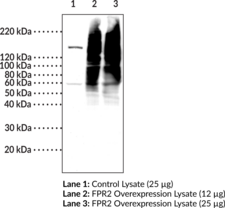Territorial Availability: Available through Bertin Technologies only in France
- Correlated keywords
- FPR-2 HM-63 LXA4 A?-42 Listeria proinflammatory
- Product Overview:
Formyl peptide receptor 2 (FPR2) is a G protein-coupled receptor (GPCR).{42688} It is encoded by FPR2 and is expressed in lung, kidney, spleen, placenta, macrophages, peripheral blood leukocytes, synovial fibroblasts, T cells, and intestinal epithelial cells. FPR2 is coupled to the Gi/o transduction pathway and is activated by various ligands including formyl peptides from bacteria and mitochondria, endogenous and aspirin-triggered resolvin D1, lipoxin A4 (Item No. 90410), annexin A1 (Item No. 19881), amyloid-? (1-42) (A?42; Item No. 20574), and prion protein (106-126) (Item No. 24556), among others.{42688,42689,42690} Activation of FPR2 by formylated bacterial peptides increases monocyte chemotaxis and neutrophil recruitment in vitro, and fpr2-/- mice exhibit increased bacterial load and reduced neutrophil infiltration in response to L. monocytogenes infection.{42691} FPR2 activation by resolvin D1 (Item No. 10012554) reduces production of pro-inflammatory cytokines and reduces inflammatory pain in various murine models.{42687} Expression of FPR2 is increased in mononuclear phagocytes in postmortem brain tissue from patients with Alzheimer’s disease and transient interaction of A?42 with FPR2 promotes receptor complex internalization and cytosolic deposition of A?42 in macrophages.{42692} Cayman’s FPR2 (C-Term) Polyclonal Antibody can be used for Western blot and immunohistochemistry (IHC) applications. The antibody recognizes the C-terminus of FPR2 from human samples.
Cayman Chemical’s mission is to help make research possible by supplying scientists worldwide with the basic research tools necessary for advancing human and animal health. Our utmost commitment to healthcare researchers is to offer the highest quality products with an affordable pricing policy.
Our scientists are experts in the synthesis, purification, and characterization of biochemicals ranging from small drug-like heterocycles to complex biolipids, fatty acids, and many others. We are also highly skilled in all aspects of assay and antibody development, protein expression, crystallization, and structure determination.
Over the past thirty years, Cayman developed a deep knowledge base in lipid biochemistry, including research involving the arachidonic acid cascade, inositol phosphates, and cannabinoids. This knowledge enabled the production of reagents of exceptional quality for cancer, oxidative injury, epigenetics, neuroscience, inflammation, metabolism, and many additional lines of research.
Our organic and analytical chemists specialize in the rapid development of manufacturing processes and analytical methods to carry out clinical and commercial GMP-API production. Pre-clinical drug discovery efforts are currently underway in the areas of bone restoration and repair, muscular dystrophy, oncology, and inflammation. A separate group of Ph.D.-level scientists are dedicated to offering Hit-to-Lead Discovery and Profiling Services for epigenetic targets. Our knowledgeable chemists can be contracted to perform complete sample analysis for analytes measured by the majority of our assays. We also offer a wide range of analytical services using LC-MS/MS, HPLC, GC, and many other techniques.
Accreditations
ISO/IEC 17025:2005
ISO Guide 34:2009
Cayman is a leader in the field of emerging drugs of abuse, providing high-purity Schedule I-V Controlled Substances to federally-licensed laboratories and qualified academic research institutions for forensic analyses. We are certified by ACLASS Accreditation Services with dual accreditation to ISO/IEC 17025:2005 and ISO Guide 34:2009.





